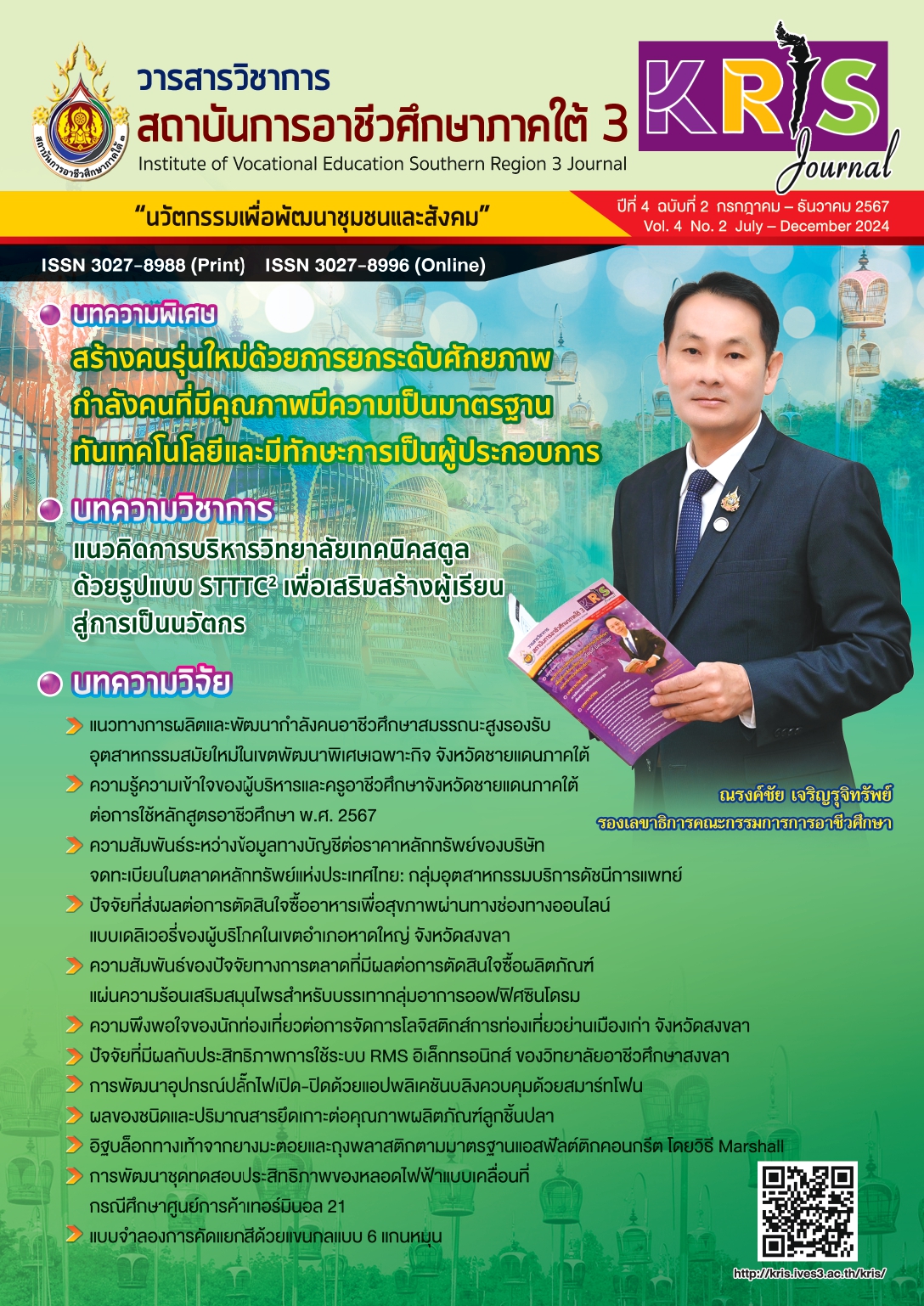Development of a Smart Plug Controlled via a Smartphone Application Using Blynk
Keywords:
power strip set, Internet of Things, electrical control systemAbstract
The purposes of the study on the development of a smart plug controlled via a smartphone application namely Blynk were to: 1) develop an on-off function in a smart plug controlled by a smartphone application namely Blynk and 2) study the satisfaction of users towards the smart plug controlled by a smartphone application namely Blynk. The research tools included an electrical plug, an efficiency test for the smart plug controlled by a smartphone application namely Blynk, and Likert scale questionnaires for users to report their satisfaction towards the developed smart plug. The research statistics included percentage, mean, and standard deviation. The results of the study showed that the developed smart plug controlled by a smartphone application namely Blynk can be used to control the on-off function of all 4 sockets effectively with the overall effectiveness at a high level (=4.24, S.D.=0.48). When considering on each aspect, the results are as follows. In terms of design, it is suitable for actual use with the users’satisfaction at a high level (
=4.00, S.D.=0.71). The suitability of the device size was also high (
=4.20, S.D. =0.84), the practicality and the convenience of the implementation were very high (
=4.60, S.D. =0.55). The safety in using the device was at a high level (
=4.40, S.D. =0.55), and capability for an actual use was also high (
=4.00, S.D.=1.00). Finally, the users reported their satisfaction towards the smart plug at a high level in overall.
References
ดวงใจ งามศิริ, นิพนธ์ บุญสกันต์, และซูฟียัน แวดือรามัน. (2567). การพัฒนาระบบจัดการฟาร์มอัฉริยะ i-Smart Farm. วารสารวิชาการสถาบันการอาชีวศึกษาภาคใต้ 3, 4(1), 71-80.
ชินวัจน์ งามวรรณากร, สุทัศน์ รุ่งระวิวรรณ, และอมรเทพ มณีเนียม. (2561). รายงานการวิจัย เรื่อง การพัฒนาระบบควบคุมอุปกรณ์ภายในโรงงานขนาดย่อมด้วยเทคโนโลยีไร้สายผ่านแอปพลิเคชันบนอุปกรณ์เคลื่อนที่ภายใต้แนวคิดอินเทอร์เน็ตสำหรับทุกสรรพสิ่ง. คณะมนุษยศาสตร์และสังคมศาสตร์ มหาวิทยาลัยราชภัฏยะลา. https://wb.yru.ac.th/bitstream/yru/5544/1/3.pdf
กรมวุฒิ นงนุช. (2561). รายงานการวิจัย เรื่อง ระบบสั่งงานด้วยเสียงบนเทคโนโลยีสรรพสิ่งเพื่อประยุกต์ควบคุมมอเตอร์ในงานด้านเกษตรกรรม. มหาวิทยาลัยเทคโนโลยีราชมงคลสุวรรณภูมิ. https://research.rmutsb.ac.th/fullpaper/2561/research.rmutsb-2561-20191128152831355.pdf
ขวัญเรือน วงษ์ไทย. (14 ธันวาคม 2565). เสียบปลั๊กทิ้งไว้ยังไงก็กินไฟ. การไฟฟ้าส่วนภูมิภาค. https://www.pea.co.th/ข่าวสารประกาศ/ข่าวประชาสัมพันธ์/ArtMID/542/ArticleID/152183/เสียบปลั๊กทิ้งไว้ยังไงก็กินไฟ
การไฟฟ้านครหลวง. (2565). อุบัติภัยประชาชนเนื่องจากไฟฟ้า. https://www.mea.or.th/statistics/accident-electricity
สุชาติ ดุมนิล. (2566). การพัฒนาระบบควบคุมการวัดค่าอุปกรณ์ไฟฟ้าด้วยเทคโนโลยี IoT. วารสารวิชาการเทพสตรี I-TECH. 18(1). 1-16.
ประภาส สาระศาลิน. (2564). การประเมินการใช้สัญญาณไวไฟ probe เพื่อพัฒนาระบบตรวจจับคน [วิทยานิพนธ์ปริญญามหาบัณฑิต, มหาวิทยาลัยศิลปากร]. DSpace. http://ithesis-ir.su.ac.th/dspace/bitstream/123456789/3903/1/61318303.pdf
ณัฐดนัย สิงหคลีวรรณ, ธนกฤต จินดาศรี, และรัตนสุดา สุภดนัยสร. (2565). การพัฒนาตนแบบปลั๊กไฟอัจฉริยะสำหรับการตรวจสอบและจัดการพลังงานไฟฟาในบ้านอัจฉริยะ. วารสารวิชาการเทพสตรี I-TECH. 17(2). 159-169.
กอบเกียรติ สระอุบล. (2561). พัฒนา IoT บนแพลตฟอร์ม Arduino และ Raspberry Pi. อินเตอร์มีเดีย.
อภิรักษ์ พันธุ์พณาสกุล, ฟิตรี ยะปา, และอัลนิสฟาร์ เจะดือราแม. (2563). การพัฒนาระบบเปิด-ปิดไฟด้วยไมโครเซนเซอร์ควบคู่กับแอปพลิเคชันบนสมาร์ทโฟน. ใน การประชุมหาดใหญ่วิชาการระดับชาติและนานาชาติ ครั้งที่ 11 (หน้า 994-10). มหาวิทยาลัยหาดใหญ่.
Downloads
Published
How to Cite
Issue
Section
License
Copyright (c) 2024 Institute of Vocational Education Southern Region 3 Journal (KRIS Journal)

This work is licensed under a Creative Commons Attribution-NonCommercial-NoDerivatives 4.0 International License.






